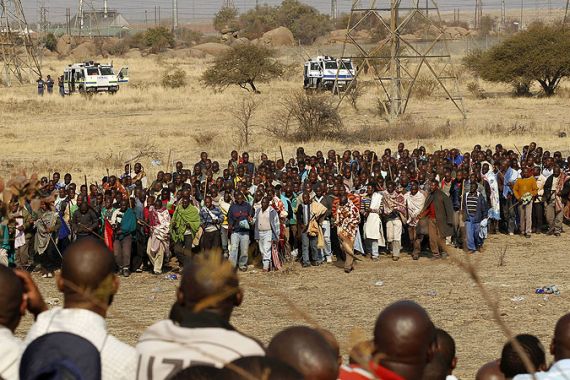South Africa miners in stand-off with police
Situation “stable but tense” outside mine as striking workers lined up against scores of police backed by helicopters.

Thousands of armed striking miners faced off with South African police at Lonmin’s Marikana mine after it halted production following the deaths of 10 people in fighting between rival unions.
Scores of police backed by helicopters lined up on Wednesday opposite a crowd of around 2,500 miners armed with machetes, clubs and other weapons, who had taken up position on a rocky outcrop overlooking the mine.
“The situation is stable but tense. We are busy with negotiations and are maintaining a high visibility in the area,” Dennis Adrio, the national police spokesman, said.
Lonmin secured a court order compelling the miners to return to work on Wednesday, with permission to dismiss them if they fail to do so.
“If we believe that this criminal activity is still continuing and that rock drill operators are still on this illegal strike we will have no option but to issue the ultimatum,” Barnard Mokwena, the company’s executive vice president, said.
‘Social challenges’
Thousands of Lonmin rock drill operators began their strike on Friday at the Lonmin platinum mine near Marikana, protesting over poor work conditions and wages in the latest in a series of strikes to hit the mining industry.
Ten people including two police officers, two security guards, three protesters and three other men had been killed since then.
The protests are believed to be linked to rivalry between the National Union of Mineworkers (NUM) and the Association of Mineworkers and Construction Union (AMCU) over recognition agreements at the mine.
NUM president, Senzeni Zokwana was not well received on Wednesday when he arrived to speak to the strikers in an armoured vehicle. His call for the miners to return to work was met with shouting and chanting from the crowd until he had to be escorted by police.
Frans Baleni, general secretary of the NUM, on Tuesday blamed the violence on the newer AMCU.
“These people are taking advantage of the common social challenges of people in this area,” the union leader said.
“There’s a high level of unemployment as we know, secondly workers are highly indebted, so it’s easy to go to workers and say that if you belong to us, we will get you” more money.
The NUM is one of the most influential pillars of the Congress of South African Trade Unions, a labour federation which is part of South Africa’s governing alliance led by the ruling African National Congress.
Workers are also demanding higher wages.
Poor conditions
The majority of the striking mineworkers live in a squalid settlement adjacent to the mine, with no running water, reports AFP news agency.
“We can’t afford a decent life. We live like animals because of poor salaries we are getting from there,” said Thuso Masakeng, pointing at the gigantic site with towers belching smoke.
“We are being exploited, both the government and the unions have failed to come to our rescue. Companies make a lot of money at our expense and we get paid almost nothing,” he said as he walked away from the hill top.
A report released on Tuesday by the Bench Marks Foundation, a non-governmental organisation monitoring the practices of multinational mining corporations, found Lonmin workers often live in deteriorating shacks without electricity.
Some children suffer from chronic illnesses due to sewage spills caused by broken drainage, the report said.
Lonmin, the world’s third-largest platinum producer, threatened to sack 3,000 rock drill operators if they fail to end an illegal pay strike, its flagship mine 100km northwest of Johannesburg.
London-headquartered Lonmin’s operations in South Africa accounts for 12 per cent of its global platinum output.
South Africa remains one of the world’s dominant producers of platinum, gold and coal, with 80 per cent of known platinum reserves, but many of its workers still face abysmal salaries and living conditions.